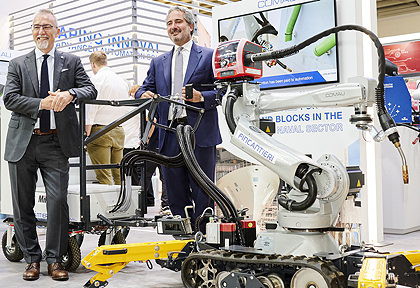[ad_1]
Mobile welding robot ‘raises productivity and cuts costs’

Two Italian companies – the robot-maker Comau and the shipbuilder Fincantieri – have unveiled a mobile robotic welding system at the Automatica exhibition in Germany. They say that the MR4Weld (Mobile Robot for Welding) could deliver a three-fold increase in productivity compared to manual techniques. Although the system is being designed and deployed initially to weld steel structures in shipyards, the developers believe that it could be reconfigured easily to address other applications and industries.
The system consists of a high-payload, six-axis articulated robot fitted with a welding torch that is installed on a tracked undercarriage and equipped with a vision system to identify welding joints. Designed to operate in any environment and to collaborate with workers, the MR4Weld can be managed by a single operator. Digital tools collect welding and production data that can be used to document the welded joints.
Because the welding robot complies with current safety regulations, it can be used without fences. Fincantieri and Comau have jointly filed a European patent application for certain technological aspects of the system.
The two companies, which have been working on the technology since 2021, say that it will guarantee better welding quality while reducing ergonomic risks. It will transform shipbuilding processes by ensuring greater flexibility and improved safety, while also cutting costs. Prototypes are currently being tested and if these trials prove successful, the robots will used in Fincantieri’s shipyards to weld steel structures autonomously.
The two companies have also renewed a strategic agreement to apply technology, digitalisation and innovation to cutting-edge, mobile robotic systems that will increase production speeds and enhance worker well-being, by automating traditionally manual processes.
As part of the collaboration, the companies will develop advanced and mobile robots to automate other repetitive shipbuilding activities, including those characterised by vertical and non-linear surfaces, as well as unstructured environments. They plan to industrialise the MR4Weld technology for use in other sectors that produce large steel structures. They also plan to test exoskeletons that Comau has developed to help improve ergonomics and workers’ well-being.

Comau CEO Pietro Gorlier (left) and Fincantieri CEO Pierroberto Folgiero with their mobile welding robot
Comau, part of the Stellantis conglomerate, wants to expand into new sectors beyond the factory floor.
“The extension of our collaboration reflects Comau’s determination to deliver cutting-edge, highly flexible solutions for complex production scenarios,” says the company’s CEO, Pietro Gorlier. “We also believe the significant market potential for the MR4Weld mobile robot extends beyond shipbuilding, especially given that the mobile robotics market is estimated to see a five-year CAGR of 15% (2022 to 2027), according to internal estimates and supporting market research.”
Fincantieri’s CEO Pierroberto Folgiero, adds that the MR4Weld project “meets multiple directions of our development – automation and digitisation, two driving forces of our business plan – as well as the corporate responsibility, which finds an answer in the achievement of five of the UN sustainable development goals, also with reference to safety and training”.
Comau: Twitter LinkedIn Facebook
[ad_2]
Source link
